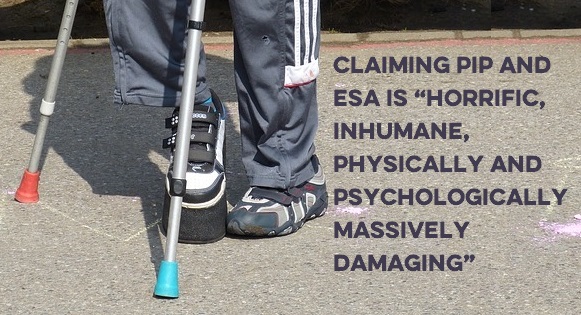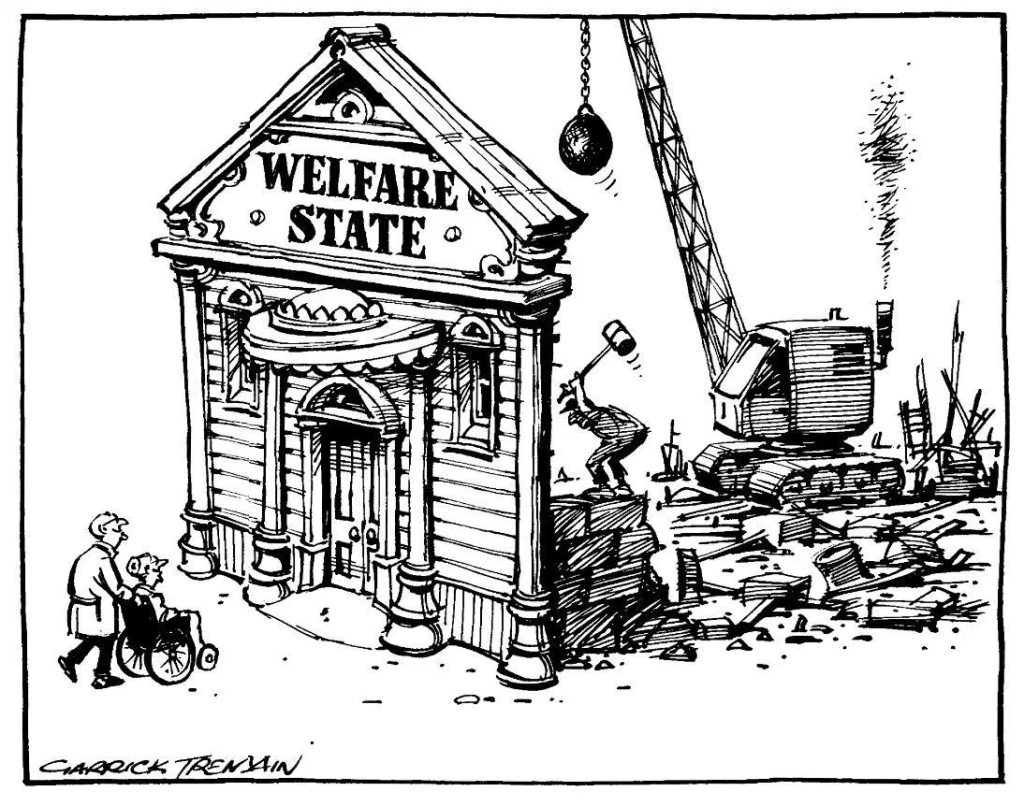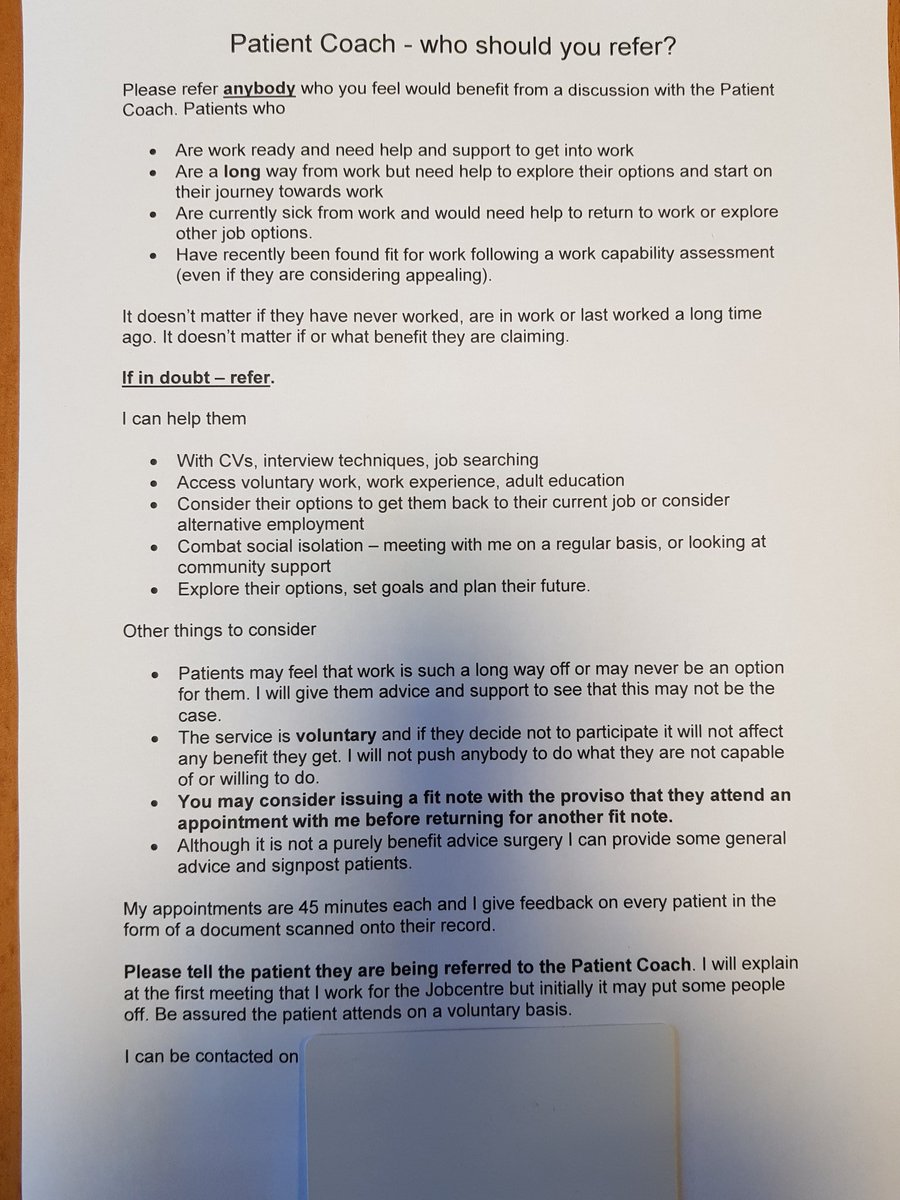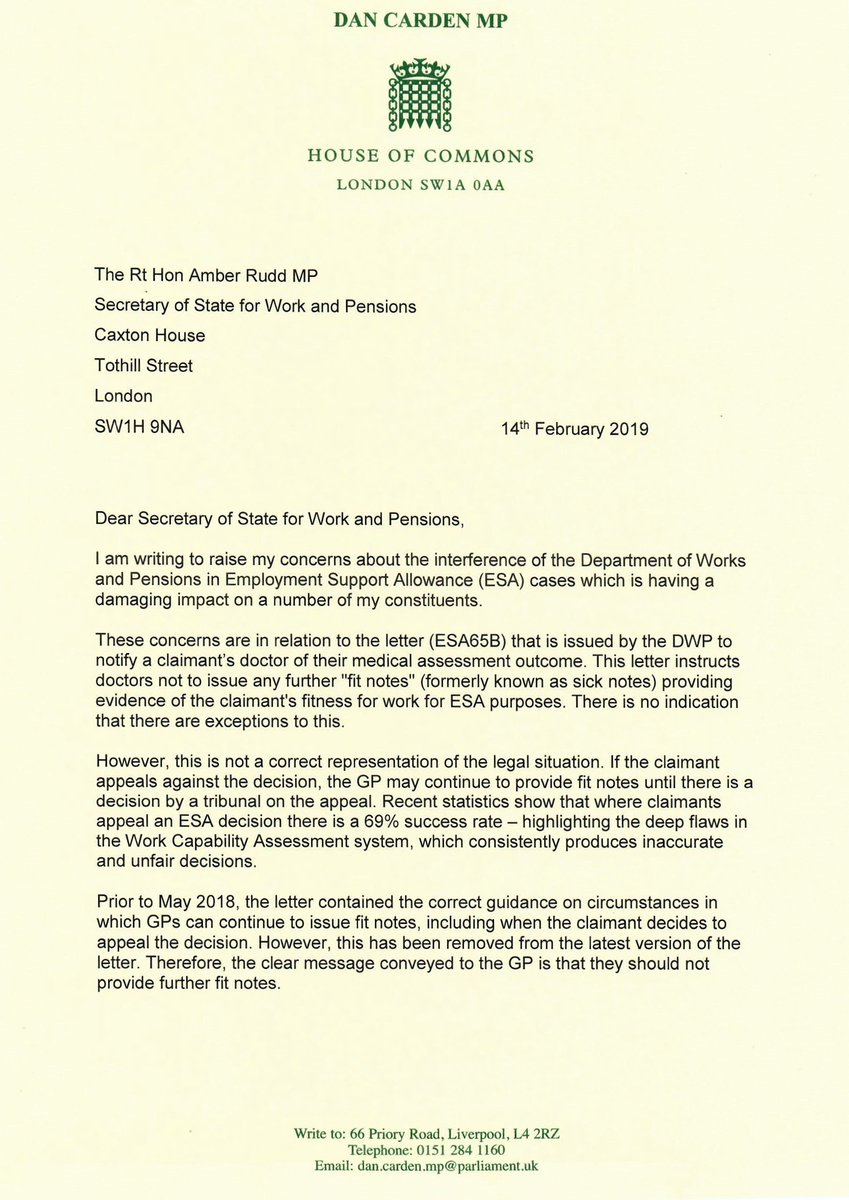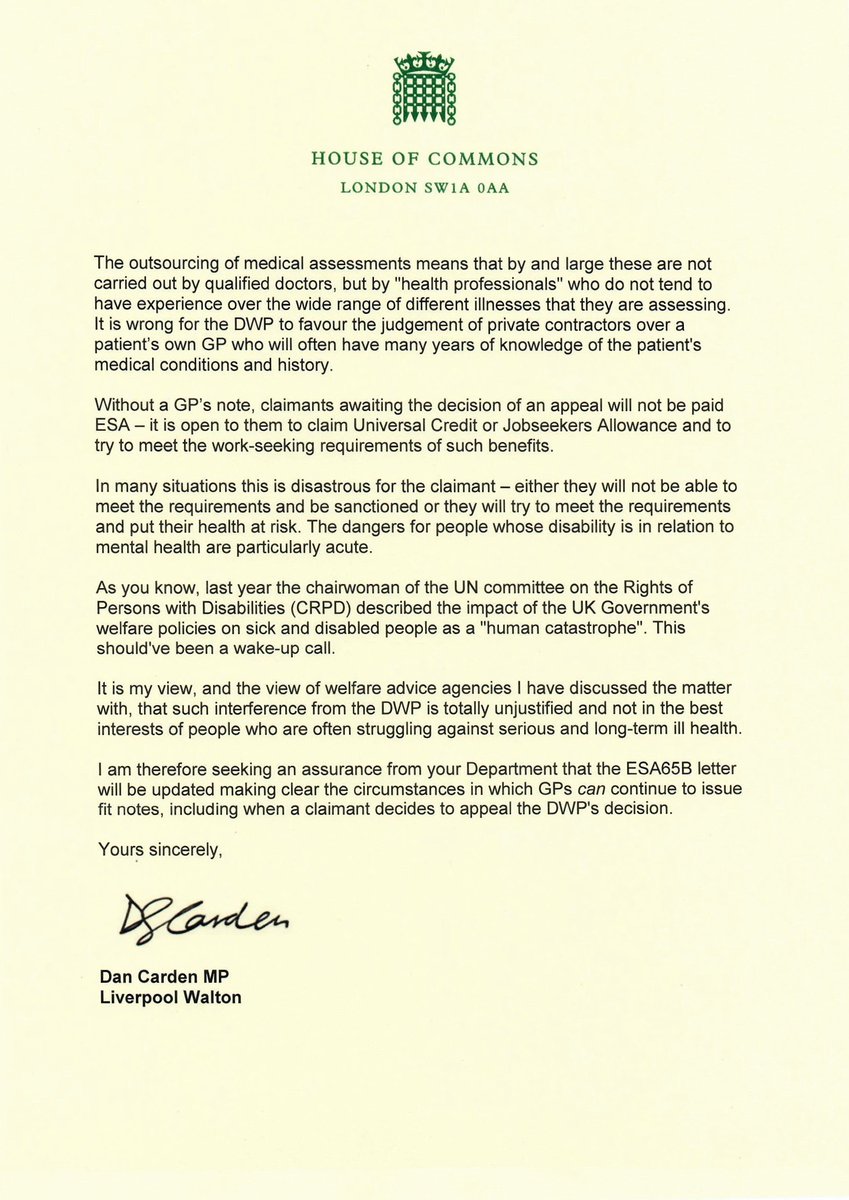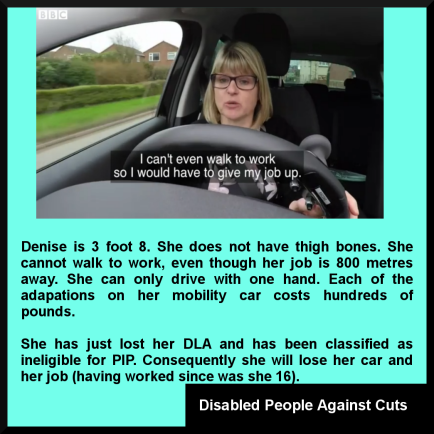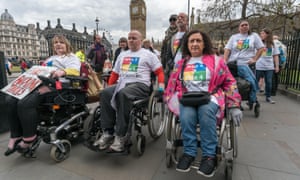
Sarah Newton, former minister of state for disabled people.
It’s very evident over the last decade that neither she nor her party actually support disabled people.
Last month and previously, I reported about the controversial issues raised by the Department for Work and Pensions’ standard ESA65B GP’s letter template, which was only relatively recently placed on the government site, following a series of probing Parliamentary Written Questions instigated by Emma Dent Coad, addressed to the minister of state for disabled people. Her responses to the questions were repetitive, vague, unevidenced and did not address the questions raised.
Campaigners and MPs have called for the Department for Work and Pensions’ (DWP) amended letter to GPs to be scrapped after it emerged that ill and disabled people appealing against unfair work capability assessment (WCA) decisions were left in near destitution after their GPs refused to provide further ‘fit notes’, because they were instructed that they did not need to by DWP officials.
It emerged that ministers ordered changes to the standard-issue letter to remove references that made it clear to GPs they may have to issue a medical statement if their patient wished to appeal against a WCA decision. The DWP claims this was not intended to dissuade GPs from issuing fit notes.
However, it’s highly unlikely that government ministers ordered the amendment to the letter for another purpose, as there are none. This was a calculated strategy to deter people from appealing DWP decisions, by leaving them in severe financial hardship.
The mandatory review was also introduced for similar reasons, since people are left without any income while the DWP reviews its decision, a process which can take longer than six weeks.
Those people who challenge WCA decisions are entitled to continue to receive employment and support allowance (ESA) at basic rate, worth £73.10 a week while they await their appeal hearing, but to do so they must obtain fit notes from their GPs to provide evidence that they are too ill to work.
They must also first await the outcome of a mandatory review before submitting their appeal. Before a claimant may lodge an appeal, they must first ask the DWP to ‘reconsider’ their original decision. There is no limit on how long the DWP may take to reconsider the original decision regarding their award.
The DWP has a stated target of upholding 80% of their original decisions, so the majority of people then have to appeal following the review outcome. The law says that the claimant may claim basic rate ESA following mandatory review if they wish to proceed with an appeal.
So the misleading change to the template letter routinely sent from the DWP to GPs has led to people who have lodged an appeal against an unfair decision being stopped from claiming basic rate ESA while awaiting the appeal hearing. This prevents many low-income disabled people from accessing any financial support while they wait for months on end to go to tribunal. Furthermore, we know that catastrophically inaccurate decisions following the assessments within the DWP are pretty much the norm. Nationally, 72% of people who appeal against their work capability assessment decision are successful.
Entitlement to ESA pending appeal is enshrined in the ESA Regulations to cover the whole of the period leading up the hearing. It is also possible to have the payment backdated to cover the Mandatory Review waiting period too – it can take over six weeks for the DWP to review their original decision, over which time people are left without welfare support.
ESA pending appeal is not paid automatically – people usually have to ask for it, and must provide fit notes from their GP, presenting these along with their appeal acknowledgment letter from the Tribunal Courts to their local Job Centre. The Job Centre should report back to the DWP who will arrange for ESA pending appeal to be paid.
From last year, then minister for disabled people, Sarah Newton, responded to one of several Written Questions from Emma Dent Coad, saying: “The ESA65B letter is issued to GPs in every case where an Employment and Support Allowance (ESA) claimant has been found ‘fit for work’. This process was built into the IT system as part of the introduction of ESA in October 2008.
That is partly untrue, since the original wording has been amended.
Newton went on to say: “Following a Ministerial requirement by the Cabinet Secretary, which was endorsed by the Secretary of State for Work and Pensions, the content of the ESA65B letter has been improved in order to explain to GPs the type of support customers can expect to receive from their local Jobcentre, and to ask GPs to encourage customers in their efforts to return to work.” [My emphasis].
The decision to change the letter template was made without any scrutiny from or consultation with parliament or the public.
The standard template letter, titled Help us support your patient to return to or start work says: “We assessed [Title] [First name] [Surname] on and decided that [select] is capable of doing some work, but this might not be the same type of work [select] may have done before.
“We know most people are better off in work, so we are encouraging [Title] [First name] [Surname] to find out what type of work [select] may be able to do with [select] health condition or disability through focused support at [select] local Jobcentre Plus.
“In the course of any further consultations with [Title] [First name] [Surname] we hope you will also encourage [select] in [select] efforts to return to, or start, work
“Please do not give [Title] [First name] [Surname] any more fit notes relating to [select] disability/health condition for ESA purposes.
Newton responded to one of several Written Questions from Emma Dent Coad, saying: “The ESA65B letter is issued to GPs in every case where an ESA claimant has been found ‘fit for work’. This process was built into the IT system as part of the introduction of ESA in October 2008.
“Following a Ministerial requirement by the Cabinet Secretary, which was endorsed by the Secretary of State for Work and Pensions, the content of the ESA65B letter has been improved in order to explain to GPs the type of support customers can expect to receive from their local Jobcentre, and to ask GPs to encourage customers in their efforts to return to work.” [My emphasis].
Professor Helen Stokes-Lampard, the chair of the Royal College of GPs (RCGP), said the lack of clarity over when GPs should issue fit notes could put patients’ finances and health at risk. “No GP wants that, and it only serves to threaten the long-standing trust that patients have in their family doctor.”
Until 2017 the standard letter advised GPs that if their patient appealed against the WCA decision they must continue to provide fit notes.
However, on (undisclosed) ministerial orders, the letter now states that GPs “do not need to provide any more fit notes for ESA purposes”. It does not mention the possibility that the patient may appeal, or that a fit note is needed for the patient to obtain ESA payments until the appeal is heard.
Frank Field, the chair of the work and pensions select committee, also raised the issue with Newton back in January. Newton replied that the wording was amended “to make the letter simpler and clearer”, adding that DWP communications were intended to be “clear, understandable and fit for purpose”.
The purpose appears to be to deter people from appealing unfair DWP decisions concerning the loss of their social security disability award.
Field replied that the wording was “not having the desired effect”, and urged her to revise it to make clear ESA claimants on appeal were entitled to fit notes. “This simple step could greatly ease the stress and worry that people who are awaiting an appeal experience.”
Newton told Field: “We are committed to ensuring our communication is clear, which is why the wording of this letter was cleared by both the British Medical Association and the Royal College of General Practitioners (RCGP). However, we will of course consider feedback when revising the letter.” Newton tends to stick to a script in her responses, though. She told Emma Coad Dent exactly the same thing, almost word for word last year, in her response to a Written Question.
As I commented in a previous article, it was extremely unclear on what basis the RCGP agreed to the new wording as the change was agreed at a DWP stakeholder meeting for which, according to Newton, there are no formal minutes.
Newton confirmed this in the correspondence between herself and Field, as well as in her responses to Emma Coad Dent’s long series of Written Questions on this issue.
Firstly, on 16 May, last year, Newton says: “The Cabinet Secretary first issued the requirement to revise the ESA65B letter in November 2014.
“The wording of the ESA65B was changed to emphasise the benefits of work and to ask GPs to encourage their patients in their efforts to return to some form of work.”
Then, according to Newton: “The British Medical Association and the Royal College of General Practitioners agreed to the revised wording of the ESA65B on 4 August 2016.”
However, in June last year, she also said, in response to a Written Question from Emma Dent Coad: “DWP’s Legal Service cleared the revised wording on 29 July 2016 and the then Secretary of State for Work and Pensions subsequently authorised the changes.”
Yet when asked in November last year what written evidence her Department holds on the British Medical Association and Royal College of General Practitioners agreement to the revised wording of the ESA65B letters sent to claimants’ GPs when they fail the work capability assessment, she replied: “There is no written evidence relating to the agreement obtained from the British Medical Association and the Royal College of General Practitioners on the revised wording of the ESA65B letter.
“In accordance with the Answer of 30 May 2018 to Question 146987, agreement on the final wording of the ESA65B was obtained via the regular meetings DWP holds with both organisations.”
She was being conservative with the truth. In other words, she was telling lies.
Following a series of distressing reports about people dying as they await the result of the Personal Independent Payment (PIP) and ESA assessments, the Work and Pensions select Committee has published the Royal College of GPs’ (RCGP) and the British Medical Association’s (BMA) views on DWPs controversial advice to doctors on “Fit Notes” for people awaiting the outcome of an ESA appeal.
The Committee asked both organisations (![]() PDF 163 KB)
PDF 163 KB)![]() (
(![]() PDF 163 KB)
PDF 163 KB)![]() for their input, following DWP’s repeated claims that they had approved the advice, given in a letter (form, ESA65B) to the GPs of people who have been denied ESA after assessment: PIP and ESA Assessments.
for their input, following DWP’s repeated claims that they had approved the advice, given in a letter (form, ESA65B) to the GPs of people who have been denied ESA after assessment: PIP and ESA Assessments.
The Committee has described the assessment processes for disability/incapacity benefits as “gruelling” and “error-ridden”, potentially forcing claimants into DWP’s “arduous, protracted” reconsideration and appeals process. People who have been denied ESA at the assessment stage, but who are awaiting the results of their appeal are entitled to an “assessment rate” of ESA, in recognition of the hardship they may endure during the potentially lengthy wait for their appeal.
However, in recent months the Committee has been investigating concerns (![]() PDF 1.41 MB)
PDF 1.41 MB)![]() that the advice DWP is giving to doctors about the system and process is causing confusion, leading directly to people being left without the lifeline income they are entitled to.
that the advice DWP is giving to doctors about the system and process is causing confusion, leading directly to people being left without the lifeline income they are entitled to.
I have reported previously that people have died soon after being declared ‘fit for work’ by the DWP, after the Department have contacted a patients’ doctor without notifying them, telling the GP not to issue any more ‘fit’ notes.
Comments from RCGP and BMA
The Department has claimed in response to the Committee (![]() PDF 219 KB)
PDF 219 KB)![]() that Agreement on the final wording of the revised ESA65B was obtained via the regular meetings DWP holds” with both the British Medical Association and Royal College of GPs”, (
that Agreement on the final wording of the revised ESA65B was obtained via the regular meetings DWP holds” with both the British Medical Association and Royal College of GPs”, (![]() PDF 84 KB)
PDF 84 KB)![]() and that the wording is the outcome of “close and extensive working between DWP, BMA and RCGP.” (
and that the wording is the outcome of “close and extensive working between DWP, BMA and RCGP.” (![]() PDF 165 KB)
PDF 165 KB)![]()
Both medical professionals’ associations’ have now written to the Committee – and in the case of the RCGP, directly to the Secretary of State (![]() PDF 199 KB)
PDF 199 KB)![]() – expressing their concerns about both DWP’s advice to GPs and its characterisation of their approval or endorsement. The RCGPs said:
– expressing their concerns about both DWP’s advice to GPs and its characterisation of their approval or endorsement. The RCGPs said:
“Without a fit note from their GP, claimants who are awaiting the outcome of their appeal will not be able to receive ESA. They would therefore have to seek Universal Credit or Jobseekers Allowance, and subsequently try and meet the work-seeking requirements of those benefits, potentially endangering their health in the process. As such the College is deeply concerned about the potential impact of this on doctors and their relationships with potentially vulnerable patients.”
As the BMA describes in its response to the Committee (![]() PDF 164 KB)
PDF 164 KB)![]() :
:
“By way of background the BMA attends meetings with the RCGP and the DWP where information is shared with the aim of improving working practices between the DWP and clinicians. While the BMA may act in an advisory capacity it does not have the authority to clear, approve or otherwise sign off any DWP correspondence or policies and would see this as being clearly outside of our remit…At a meeting with the DWP and RCGP a BMA representative was given sight of the ESA65B amended letter. The BMA considers that sight of this letter was for the purposes of information sharing and did not agree or otherwise sign off the content of the letter.”
The Royal College of GPs put the same point to the Committee (![]() PDF 197 KB)
PDF 197 KB)![]() :
:
“We are aware that the Department claims that ‘The British Medical Association and the Royal College of General Practitioners agreed to the revised wording of the ESA65B on 4 August 2016’. However, there is some ambiguity about what was said in the referenced meeting with the DWP. Since the DWP did not keep any written records of what was said at this meeting [as DWP admits in its latest letter to the Committee (
PDF 165 KB)
], we are unable to provide further clarity.”
The RCGP statement continues:
“Since these changes were made, significant evidence has come to light about the negative impact that these changes have had in relation to patient care, leading to some patients being denied fit notes by their doctors. We are concerned that the current wording of ESA65B does not sufficiently clearly indicate that there are circumstances in which GPs may need to continue to issue fit notes for their patients. It is essential that communication with GPs is as clear as possible, to uphold the high levels of trust that exist between GPs and their patients. As a minimum we would want to see the wording of the ESA65B letter urgently changed to its previous wording.”
This means that ministers have once again mislead both parliament and the public in claiming that both medical professional organisations agreed to the wording of a controversial letter which told GPs not to provide benefits officials with proof that seriously ill patients were unfit for work.
I’ve reported on this particular issue more than once, and highlighted the parliamentary dialogue between Newton, who resigned in March, and the DWP, who have said in separate statements that the document wording “was cleared by both the British Medical Association and the Royal College of General Practitioners”.
Both organisations have now dismissed Newton and the DWPs’ claim. In the letter, the BMA, said that they did not “clear” the wording, they were simply been shown the letter template during a meeting at the DWP.
When the organisation wrote to Frank Field, Pensions select committee, the letter states categorically that: “The BMA considers that sight of this letter was for the purposes of information sharing and did not agree or otherwise sign off the content of the letter.”
The RCGP has told work and Pensions secretary Amber Rudd that the letter “does not clearly indicate that there are exceptions to this wording, including if a claimant is appealing against the decision”.
The Royal College raised fears that vulnerable patients awaiting the outcome of appeals may further harm their health by trying to meet the requirements of other benefits such as Universal Credit or Jobseeker’s Allowance.
However, a DWP spokesperson told me: “We have regular discussions with the BMA and RCGP to ensure we deliver effective support to disabled people and those with health conditions.
“The wording of this letter was discussed as part of these meetings, as both organisations confirm, as was the release of the final letter.
“Of course we recognise the concerns of GPs which is why we are discussing a revised letter with the BMA and RCGP and have issued clear guidance for GPs in the meantime.”
So, not only did the DWP and Conservative ministers lie and get caught out, they have continued to repeat the lie following its exposure.
Meanwhile citizens who are ill and disabled are left in dangerous situations with unacceptable levels of hardship, and some have died as a consequence, yet the government continues to present and mechanically repeat crib sheeted PR and strategic comms responses to limit the political damage of justified concern and criticism of their cruel, miserly, punitive, discriminatory, robotic neoliberalism and authoritarian policies that target those with the least in any way they can to prevent them from accessing the support that their taxes and National Insurance have contributed to creating.
When David Cameron said the Conservative party was going to address the ‘culture of entitlement’, and ‘change the relationship between citizens and the state’ this is precisely the kind of underhand, targeted discrimination he had in mind. The ‘low tax, low welfare society’ is one where the wealthiest pay very little tax and the poorest citizens – in work and out – simply go without the means of meeting their most fundamental needs.
The wider political aim is to systematically dismantle every single welfare and public service and to normalise the brutality of this process by almost inscrutable degrees, by telling lies that attempt to neutralise the serious concerns raised by campaigners, opposition MPs, academics, charities and medical professionals. This method of political gaslighting is much worse than lying, because it is a calculated, deliberate method of psychological manipulation and abuse.
I don’t make any money from my work. But if you like, you can contribute by making a donation which helps me continue to research and write informative, insightful and independent articles, and to provide support to others going through disability assessment and appeals. The smallest amount is much appreciated – thank you.



